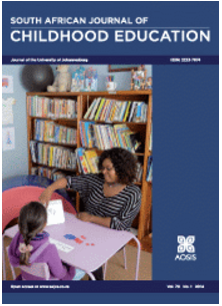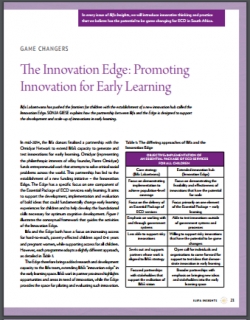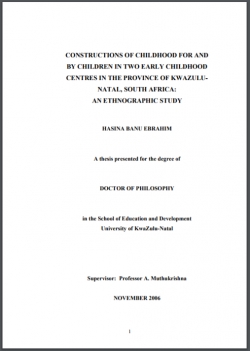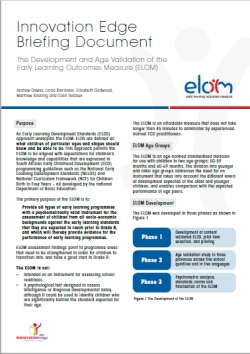Understanding beneficiaries experiences of quality in early learning centres
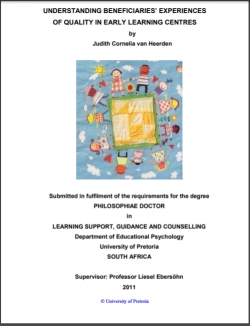
Type
Thesis
Authors
Category
ECCE
[ Browse Items ]
Publication Year
2012
Publisher
University of Pretoria, Pretoria, South Africa
URL
[ private ]
Tags
Abstract
The purpose of this study was to explore the concept of quality in early learning centres which could serve as the groundwork for the development of an early learning quality assurance framework in South Africa. The data used reflects different beneficiaries‘ experiences of quality in early learning centres. The unique contexts of, and situations at early learning centres were considered. A theoretical framework, based on Woodhead‘s model on quality development, informed the study. The framework consists of input (structural), process and outcome quality indicators. In this explanatory instrumental case study framed within social constructionism, the researcher partnered with 235 teachers, 235 mothers and 235 teacher students from a middle-income group, to generate mixed method data using surveys, as well as interviews and reflective journals in a statistical and thematical analysis. Beneficiaries‘ conceptualisations of quality mirrored accepted norms of quality in early learning centres. Beneficiaries indicated the following as indicative of quality: children‘s social-emotional well-being and holistic development, a normative foundation for values and respect, effective infrastructure and accountable learning. Aspects regarded as quality indicators by beneficiaries were available at early learning centres. In this regard, early learning centres provided more indoor than outdoor facilities. The latter were mostly static outdoor structures which could negatively impact on sensory- and motor development. The promovenda developed a draft quality assurance framework based on the following criteria: school climate, infrastructure, curriculum, communication, teacher competence, learning environment, and support services. The findings show that aspects perceived by beneficiaries as quality indicators in an early learning centre are predominantly process indicators and hard to 'measure' in a quantitative way. A quality school climate enables emotional and social well-being. In this regard, the findings suggest that for the beneficiaries quality concerns were not about that which early learning centres have provided in terms of facilities (input indicators), but rather about centres that promote children‘s holistic well-being.
Description
Thesis (PhD)--University of Pretoria, 2012
Number of Copies
1
| Library | Accession No | Call No | Copy No | Edition | Location | Availability |
|---|---|---|---|---|---|---|
| Main | 42 | 1 | Yes |
